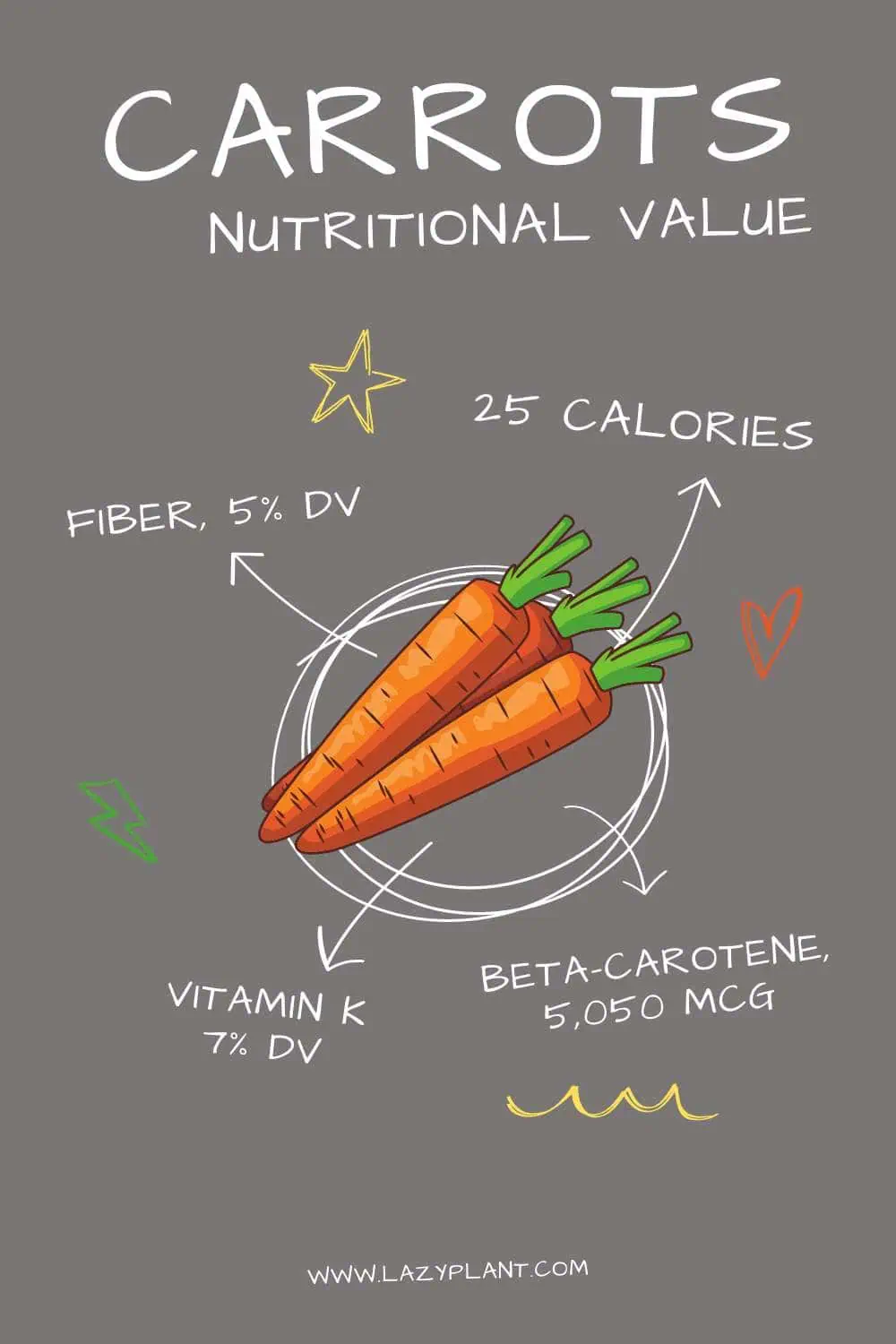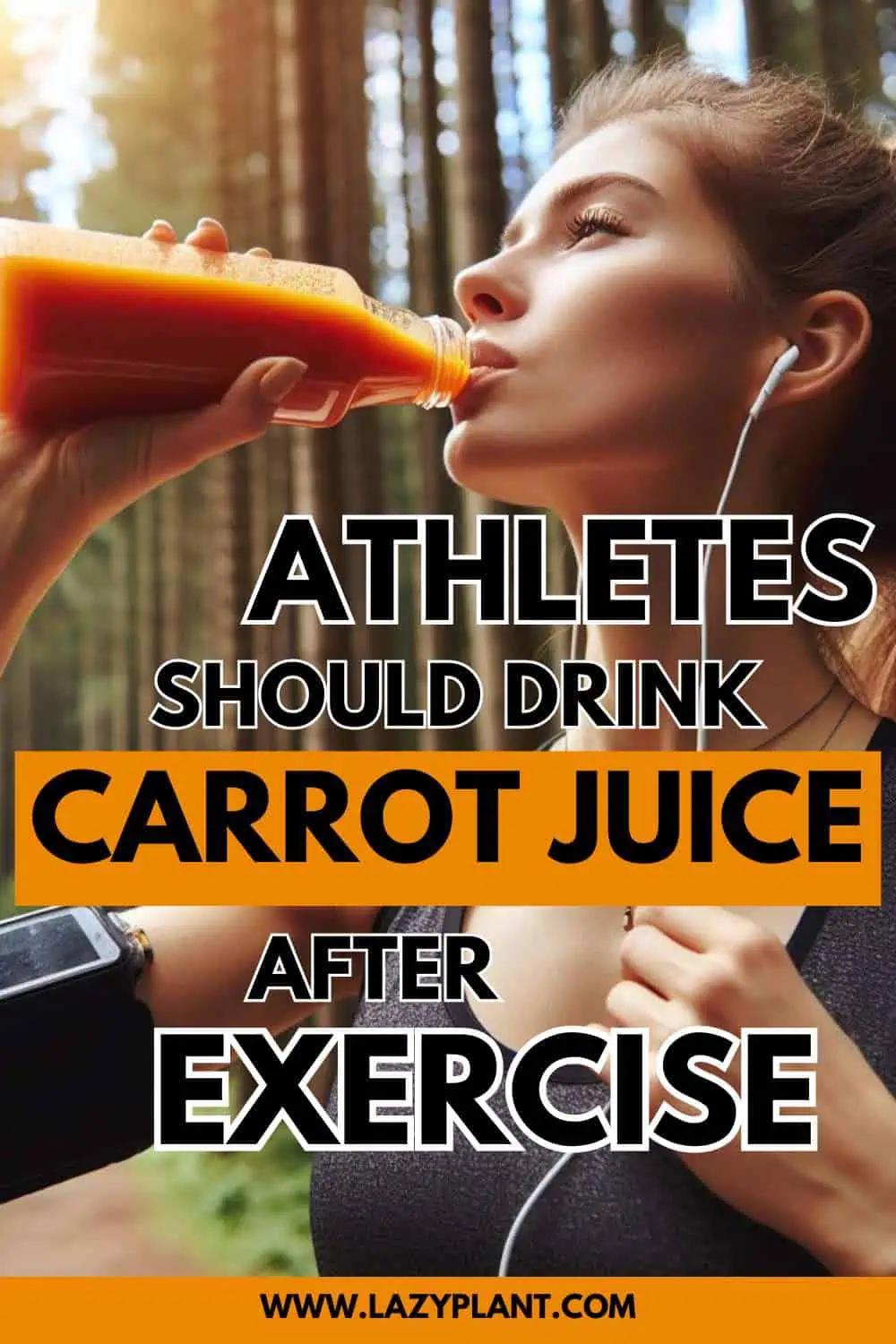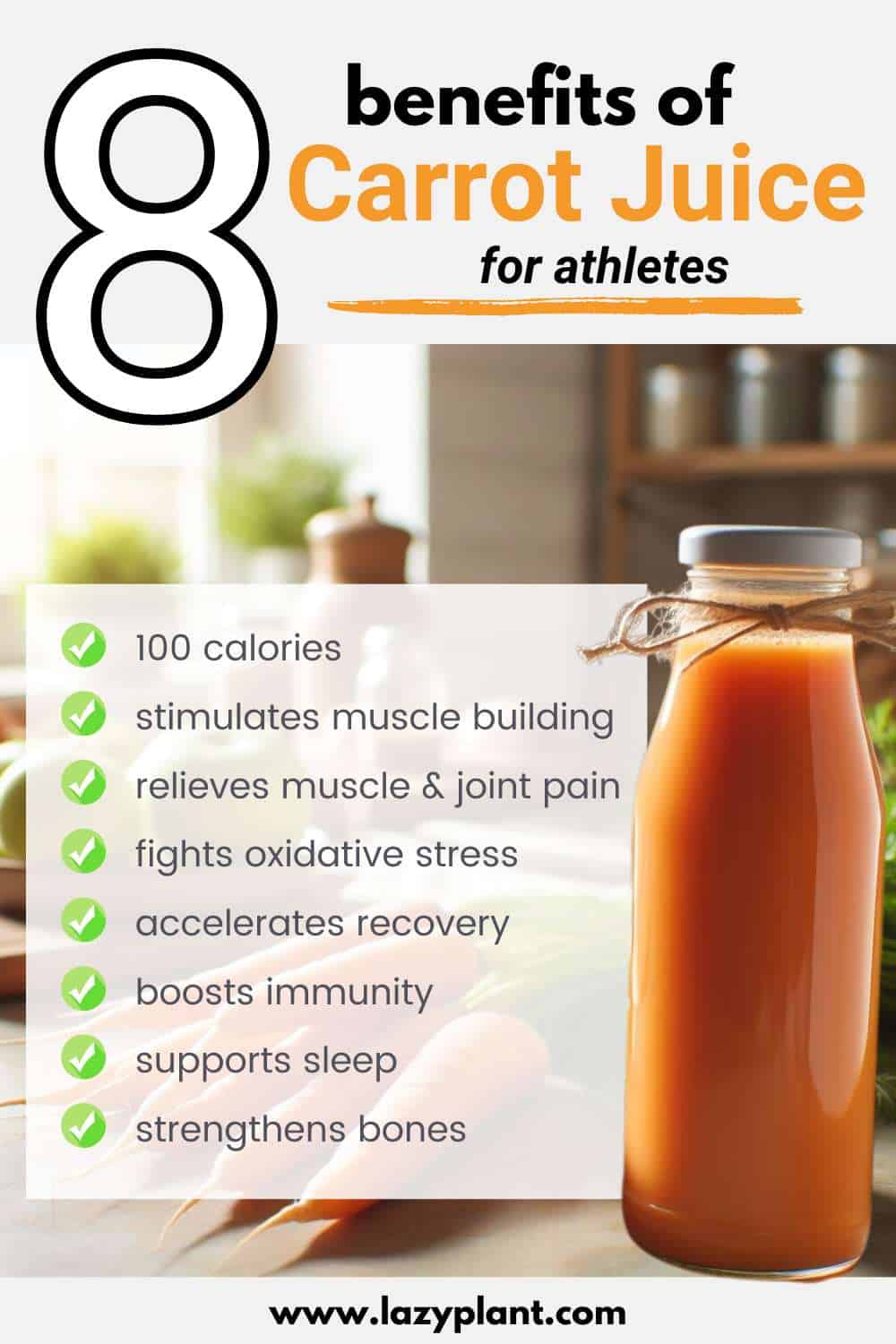Drinking a glass of carrot juice after strenuous exercise could accelerate recovery time, stimulate muscle building, relieve muscle and joint pain, and strengthen the bones.
Carrot juice can increase VO2 max on endurance athletes while helping bodybuilding athletes build their dream physique, as it has fewer than 100 calories per glass, while a medium carrot has only 25 calories!
Table of Contents
Why should Athletes eat Carrots & Carrot Juice?
Carrot juice is packed with nutrients, while it has fewer than 100 calories per serving! It’s an excellent dietary source of:[1]
- vitamin K, 31% DV
- vitamin B6, 30% DV
- vitamin E, 18% DV
- thiamine, 18% DV
- potassium, 15% DV
- vitamin C, 22% DV
- copper, 12% DV
- magnesium, 8% DV
- calcium, 6% DV
- iron, 6% DV
- and carotenoids!
May Improve Endurance Performance
According to a study on soccer players, carrot juice (combined with orange juice) significantly increased the VO2 max of athletes after less than 2 weeks! A 250 mL glass of diluted carrot juice every day for 13 days was enough for a significant increase in VO2 max! It enhanced glycogen reserves, blood glucose levels, and antioxidant capacity, improving endurance performance.[2]
Beta-carotene (22,041 mcg in a cup of carrot juice) in combination with vitamin C (orange juice) has been proven to significantly increase endurance performance.
Furthermore, potassium (15% DV) in these juices is one of the key minerals for endurance exercise. Among others, it helps in the conversion of glucose to glycogen, which is saved as an energy source.
Athletes were given carrot juice made of only a large carrot (75 grams).
Carotenoids, like beta-carotene, lutein, and zeaxanthin (789 mcg), act as antioxidants that fight exercise-induced free radicals that can damage muscle cells. By minimizing this damage, carotenoids can potentially reduce muscle soreness and fatigue, allowing you to push further for longer.

Vitamin C, another antioxidant in carrot juice (22% DV), can also help reduce exercise-induced oxidative stress, potentially leading to faster recovery times after workouts.
B vitamins are involved in energy metabolism. They help your body convert carbohydrates into usable fuel for your muscles, keeping you going during those long runs.
Finally, minerals like magnesium (8% DV) and potassium are essential for proper muscle function and nerve transmission. Replenishing electrolytes lost through sweat during endurance exercise can help prevent muscle cramps and fatigue.
After all, carrot juice has a pretty low glycemic index of 43. This means that it provides steady levels of energy for longer. Raw carrots have an even lower glycemic index. It can be as low as 16![3]
May Protect Bone Health
Endurance sports put repetitive stress on bones, particularly the lower limbs. Strong bones can help resist these stresses and prevent fractures, a common injury that can sideline athletes for weeks or even months.
Dense bones can improve power transfer during activities like running or cycling. This translates to more efficient movements and potentially better performance.
In some endurance sports, particularly running and cycling, maintaining a healthy weight can be an advantage. Strong bones provide support without adding unnecessary bulk.
Carrots protect your Bones
First, fluoride in carrots (can be even more than 100% DV per serving) helps strengthen bone mineral density, potentially reducing the risk of fractures.
Vitamin A (2,266 mcg RAE in a glass of carrot juice!) is essential for maintaining healthy bone cells. It helps regulate the activity of osteoblasts, the cells responsible for building new bone tissue.
Also, vitamin K2 activates proteins involved in bone mineralization, and it helps calcium bind to bone, making it stronger and denser. Carrots are a good source of Vitamin K1 (31% DV), but only a small amount of vitamin K1 is converted to certain forms of vitamin K2 in the gut bacteria. There are only a few common foods high in vitamin K2.

The most abundant mineral in bones is calcium. It’s essential for building and maintaining strong bones. While carrot juice isn’t the richest source of calcium (6% DV per serving), it still contributes to your daily intake, while magnesium (8% DV) and phosphorus (14% DV) in carrot juice work together with calcium for optimal bone health. Magnesium helps regulate calcium absorption and metabolism.
Even vitamin C (22% DV) in carrot juice has an indirect impact on bone density, as it’s necessary for collagen production. Collagen is a protein that provides a framework for bones and connective tissues.
Most noteworthy, all these nutrients work synergistically to promote bone health. Athletes should mainly depend on a well-balanced diet rather than supplements for a strong body.
Promote Muscle Growth
Vitamin A in carrot juice ensures proper cell growth and repair within muscle tissue while carotenoids and vitamin C can minimize muscle cell damage, potentially leading to less soreness and faster recovery, allowing for more frequent workouts that stimulate muscle growth.
B vitamins aid in protein metabolism, converting food into usable energy and assisting in protein synthesis for muscle building. Carrot juice contain decent amounts of all B vitamins (except vitamin B12), while it’s an excellent dietary source of vitamin B6.
| B Vitamins | Fresh Carrots % DV | Carrot Juice % DV |
|---|---|---|
| vitamin B6 (mg) | 5,0% | 30,3% |
| niacin (mg) | 3,7% | 5,7% |
| thiamine (mg) | 3,4% | 18,2% |
| pantothenic acid (mg) | 3,3% | 3,0% |
| folate (mcg) | 2,9% | 2,4% |
| riboflavin (mg) | 2,7% | 10,0% |
Furthermore, minerals like magnesium and phosphorus support muscle function and energy production, which can benefit muscle growth during training.
While carrot juice offers some muscle-supportive nutrients, it’s generally low in protein and some other key nutrients. For optimal muscle growth, a balanced diet rich in protein, complex carbohydrates, healthy fats, and various fruits and vegetables is essential.
Post-workout Snack Ideas high in Protein
Cottage Cheese with Carrot Sticks & Edamame: Dip crunchy carrot sticks into creamy cottage cheese for a good balance of protein and carbs. Add a handful of edamame pods for extra protein and a satisfying crunch.
Carrot & Hummus Wraps: Spread hummus on whole-wheat tortillas and top with shredded carrots, sliced bell peppers for added vitamin C, and a sprinkle of sunflower seeds for extra protein and healthy fats.
Greek Yogurt Parfait with Carrot & Granola: Layer Greek yogurt, a good source of protein and calcium, with shredded carrots, sliced almonds for protein and healthy fats, and a sprinkle of granola for added texture and fiber.
Carrot & Protein Smoothie: Blend carrot juice (for a touch of sweetness), Greek yogurt, a scoop of protein powder, and a banana for potassium. This is a great post-workout option for protein and carbohydrate replenishment.

Hard-Boiled Eggs with Carrot & Celery Sticks: My favorite post-workout snack! Hard-boiled eggs are a classic protein source and one of the best dietary sources of vitamin B12 and vitamin D! Pair them with carrot and celery sticks for a satisfying and crunchy snack. Consider a dollop of hummus for added protein and healthy fats.
Turkey & Carrot Pinwheels: Spread mashed avocado on whole-wheat tortillas, layer with sliced turkey breast, shredded carrots, and a sprinkle of cheese. Roll up tightly and slice into pinwheels for a protein and veggie-packed snack.
Carrot & Trail Mix Bowl: Combine air-popped popcorn for fiber and whole-wheat crackers for complex carbohydrates. Add in a mix of chopped dried fruits for natural sweetness, roasted chickpeas for protein, and shredded carrots for a satisfying and protein-packed snack mix.
Help Build a Lean Body
One whole carrot has only about 25 calories! This makes them a fantastic snack option during a cutting phase when calorie intake needs to be restricted. You can munch on a decent amount of carrots without blowing your calorie budget.
Carrot juice is still relatively low in calories, having around 40 calories per 100ml.
Both carrots and carrot juice are among the best food option while dieting.
Accelerate Recovery
Vitamin A
During physical exertion, the body produces free radicals which can harm cells, leading to fatigue and discomfort. However, vitamin A, with its antioxidant properties, acts as a shield against these damaging molecules, reducing pain and fatigue post-exercise.
Additionally, vitamin A plays a crucial role in muscle recovery by facilitating protein synthesis. This aids in the formation of healthy connective tissues, reducing the risk of injuries and accelerating healing processes.[4]
Moreover, vitamin A plays a part in maintaining healthy mucous membranes. A strong immune system is crucial for athletes, especially during intense training periods, when your body might be more susceptible to illness.
Despite athletes’ heightened demand for vitamin A due to increased oxidative stress during intense workouts, its deficiency doesn’t directly impair performance, unlike certain micronutrients like iron. But, athletes should be mindful of getting adequate amounts.
Vitamin E
Vitamin E (up to 18% DV per glass) acts as a shield against oxidative stress as well. It plays a pivotal role in enhancing the body’s innate immune response, fostering a quicker recovery from various stressors.
Additionally, it aids in optimizing blood circulation and bolstering cardiovascular functions, thereby contributing to overall cardiovascular health.
Conversely, a deficiency in vitamin E may lead to reduced performance levels, compromised recovery processes, weakened immunity, and impaired blood flow.
According to a study, carrot juice might benefit your heart by increasing antioxidants that fight cell damage and potentially reducing the oxidation of LDL (“bad”) cholesterol, which can clog arteries.[5]
May reduce Joint Pain
Antioxidants in carrots help neutralize free radicals, potentially reducing inflammation and discomfort associated with exercise.
Also, carrot juice can contribute to your daily fluid intake. Dehydration can exacerbate muscle soreness and joint stiffness. While not a substitute for water, carrot juice might play a minor role in staying hydrated, which could indirectly reduce perceived pain.
For managing exercise-induced joint pain, focus on proven strategies like proper exercise form and recovery routines.
My Favorite Beverage for Joint Pain
The combination of pineapple and carrot juice as well as turmeric powder offers a synergistic effect in reducing inflammation and potentially alleviating joint pain.
Pineapple Juice (Bromelain): Bromelain is an enzyme found in pineapple that has some anti-inflammatory properties. It might be effective in reducing pain and inflammation.
Carrot Juice: Carotenoids in carrots help reduce exercise-induced inflammation, potentially contributing to a lessened perception of joint pain.
Turmeric Powder: Curcumin, the active ingredient in turmeric, has well-documented anti-inflammatory properties. Studies show it can be effective in managing pain associated with various conditions, including osteoarthritis and rheumatoid arthritis.
Ingredients:
- 1 cup pineapple juice (freshly squeezed or unsweetened)
- ½ cup carrot juice
- ½ teaspoon curcumin powder
- A squeeze of lemon or lime for extra flavor (optional)
Instructions:
- Safety Tip: If using fresh pineapple, wash the pineapple thoroughly, cut off the top and bottom, and remove the core. Cut the flesh into chunks.
- Juicing Option: You can juice the pineapple and carrots yourself using a juicer. This will provide the freshest flavor and the most nutrients. Alternatively, use store-bought, unsweetened pineapple and carrot juice. Look for brands that are not from concentrate and have minimal added ingredients. [BUY HERE]
- Blending Option: If you don’t have a juicer, you can blend the pineapple chunks and carrots with some water in a blender until smooth. Strain the mixture through a cheesecloth or fine-mesh sieve to remove pulp.
- Mix it Up: Combine the pineapple juice, carrot juice (or blended mixture), and curcumin powder in a glass.
- Whisk Well: Use a small whisk or fork to mix the curcumin powder thoroughly to avoid clumps.
- Adjust and Enjoy: Add a squeeze of lemon or lime for extra flavor, if desired. Taste and adjust the amount of curcumin powder to your preference. Enjoy this refreshing beverage!
This beverage can contribute to your daily fluid intake. Dehydration can worsen joint stiffness and pain, so staying hydrated is crucial.
May Help you Sleep Better at Night
During sleep, your body repairs and rebuilds muscle tissue stressed during training. This allows you to recover faster and perform better in subsequent workouts.
Without sufficient sleep, recovery is compromised, hindering performance and potentially leading to injuries.
During sleep, your body produces cytokines, proteins that help fight off infections and illnesses. Adequate sleep strengthens your immune system, making you less susceptible to getting sick and missing training sessions.
Sleep deprivation can significantly impair cognitive function, reaction time, and decision-making. For endurance athletes, focus and mental clarity are crucial for pacing, race strategy, and maintaining motivation during long events.
Also, sleep is essential for muscle growth and repair in bodybuilders. During sleep, your body releases growth hormone, which stimulates muscle protein synthesis, leading to bigger and stronger muscles. Adequate sleep promotes the production of testosterone, a key hormone for building muscle mass and strength. Sleep deprivation can negatively impact testosterone levels, hindering your strength gains.
The role of Carrots in Sleep Quality
Vitamin A plays a role in regulating melatonin production. Melatonin is a hormone that helps regulate sleep-wake cycles.
Furthermore, carrots contain a small amount of calcium, which along with certain B vitamins is essential for various bodily functions, including neurotransmitter release while other minerals relax the muscles.
Raw Carrots or Carrot Juice for Athletes?
Both raw carrots and carrot juice offer some benefits for athletes. You can enjoy them every day as part of a healthy, balanced diet.
Benefits of Drinking Carrot Juice
The juicing process makes some nutrients in carrots, like beta-carotene, more bioavailable for your body to absorb.
Carrot juice is easy to prepare, store, and carry around, making it a convenient option for athletes on the go and it also contributes to your daily fluid intake, which is crucial for staying hydrated during exercise.
However, the juicing process removes most of the fiber from carrots while it’s naturally concentrated in sugars (9 grams per serving) compared to whole carrots (3 grams per carrot).
Benefits of Eating Carrots
Raw carrots are a good source of fiber, which helps you feel full and satisfied, potentially reducing cravings and overeating. This can be beneficial for athletes watching their calorie intake. Moreover, the act of chewing raw carrots can be satisfying and help manage hunger cues.
On the other hand, compared to carrot juice, some nutrients in raw carrots, like beta-carotene, are less bioavailable and they contribute less to hydration compared to liquids like juice. Also, preparing and carrying around raw carrots can be less convenient than bringing a container of carrot juice.
But, consuming fresh carrots can be part of any balanced diet plan. They’re part of the popular Mediterranean Diet for centuries!
Eat carrot sticks (1 cup) and hummus (2 tbsp). This healthy snack has only 105 calories and 3 grams of protein.[6]
Carrot Powder is a Great Alternative
Carrot powder is a versatile ingredient that can be easily incorporated into various athlete-friendly dishes. You can add it to smoothies, protein shakes, yogurt bowls, oatmeal, soups, and stews, or even sprinkle it on top of salads or cooked vegetables.
Like carrots themselves, carrot powder is a good source of carotenoids, including beta-carotene. These can help reduce exercise-induced inflammation, potentially leading to faster recovery. Dehydration during the powdering process can make them more bioavailable.
Carrot powder is lightweight and compact, making it an excellent travel companion for athletes who need to maintain a healthy diet even when on the go.
A tablespoon has only 35 calories.
You can buy organic carrot powder on Amazon.
When should an Athlete Drink Carrot Juice?
Athletes can drink a glass of carrot juice after exercise. It accelerates recovery, boosts nutrient intake, and hydrates the body. Ideally, combine it with other fruit juices or add it to your favorite post-workout smoothie.
Moreover, you could drink it 2-3 hours before going to the gym or at breakfast. As it has a low glycemic index, carrot juice won’t spike your blood sugar after fasting.
Worst time to Consume Carrots
Avoid drinking carrot juice 30-60 minutes before exercise. It isn’t a great source of immediate energy due to its lower carbohydrate content. Moreover, the presence of fiber (5% DV) can cause stomach disturbances and deteriorating sports performance.
If you’re short on fluids and need a quick top-up before exercise, a small amount of carrot juice can contribute to your hydration. But, water and other beverages without fiber are preferable.
Also, better to avoid consuming fresh carrots and carrot powder before a workout.

How Much Can I Drink?
If opting for carrot juice, prioritize hydration benefits. Aim for a small serving, around 1 cup (250 ml) per day, especially after workouts when replenishing fluids is crucial.
Bodybuilding athletes in the cutting phase could dilute carrot juice with water to reduce the sugar content. You can also explore other vegetable juices or low-sugar smoothies for hydration and potential nutrient benefits.
On the other hand, 2-3 medium-sized carrots (around 150 grams) per day is a reasonable amount for most athletes. This provides a good balance of nutrients and fiber without exceeding needs.
Don’t rely solely on carrots or carrot juice for your daily vegetable intake. Explore a wide range of colorful fruits and vegetables for a broader spectrum of nutrients.
Not all Athletes should Consume Carrots
Athletes with Blood Sugar Management Issues: Carrot juice, while not as high in sugar as some other options, still contains natural sugars. Athletes with diabetes or prediabetes need to carefully manage their blood sugar levels. They might need to limit carrot juice intake or dilute it with water to minimize the impact on blood sugar. Better stick to fresh carrots, which are actually beneficial for people with diabetes.
Athletes with Gastrointestinal Issues: High-fiber foods like raw carrots can worsen IBS symptoms for some people. Athletes with IBS might need to limit raw carrot intake or choose alternative lower-fiber vegetables. Consulting a doctor or registered dietitian can help determine if carrots are a suitable food and recommend appropriate portion sizes.
Carrot Allergies: Although uncommon, carrot allergies can exist. Symptoms might include skin rash, itching, swelling, or even anaphylaxis in severe cases. Athletes with known carrot allergies should obviously avoid carrots and carrot juice altogether.
Consulting a doctor or registered dietitian is crucial for personalized guidance.
In most cases, athletes can enjoy carrots and carrot juice in moderation as part of a balanced diet.
Is Carrot Juice the Best Beverage for Athletic Performance?
No, carrot juice isn’t necessarily the best beverage for athletic performance. While carrot juice might offer some minor benefits, it shouldn’t be your go-to drink for athletic performance.
Actually, there isn’t a single magic beverage that can boost your sports performance.
Consider other options like sports drinks, low-fat milk, or smoothies for specific needs before, during, or after workouts.
Water should be your primary beverage choice for hydration during exercise.
Benefits of Mixing Juices
Combining different fruits and vegetables in a juice allows you to pack in a wider range of vitamins, minerals, and antioxidants than you might get from a single juice. Also, mixing juices can create more interesting and enjoyable flavors, encouraging athletes to consume more fruits and vegetables they might not enjoy on their own.
Have you heard about the benefits of tart cherry juice for athletes?